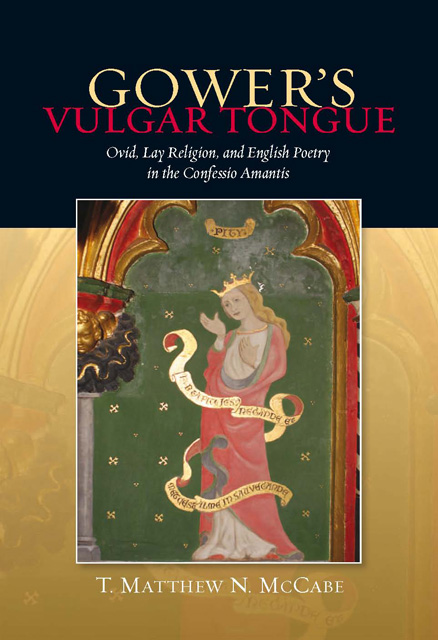Book contents
- Frontmatter
- Contents
- Acknowledgments
- Note on Abbreviations and Editions
- Abbreviations
- Introduction: Vernacularity and Public Poetry
- 1 Gower’s Ovidian Voice in English
- 2 English Writing and Lay Theology
- 3 At the Limits of Clerical Discourse
- 4 Kinde Grace
- 5 Ethics, Art, and Grace
- Conclusion: Gower and Public Poetry
- Bibliography
- Index
4 - Kinde Grace
Published online by Cambridge University Press: 14 February 2023
- Frontmatter
- Contents
- Acknowledgments
- Note on Abbreviations and Editions
- Abbreviations
- Introduction: Vernacularity and Public Poetry
- 1 Gower’s Ovidian Voice in English
- 2 English Writing and Lay Theology
- 3 At the Limits of Clerical Discourse
- 4 Kinde Grace
- 5 Ethics, Art, and Grace
- Conclusion: Gower and Public Poetry
- Bibliography
- Index
Summary
Metamorphosis in Other Words
It should now be evident that, while Gower’s lay rhetoric may bear traces of the disparagement of lay cognitive abilities that dominates so many clerical discussions of the instruction of the “lewed,” it is also strongly inflected by the same affective tendencies that had transformed late medieval lay piety and pastoral rhetoric, effectively dissolving the binaries learned/unlearned and spiritual/carnal. Nor is the “middel weie” of the Confessio simply a compromise between learned and unlearned stylistic registers, but an accommodative rhetoric that seeks to make moral wisdom as attractive as possible “for Engelondes sake” and meet wise and simple alike in a common mode that takes full advantage of the strengths of the vernacular. The vernacular rhetoric of the Confessio affects a voice that, while essentially extraclerical, is not secular in the modern sense but, on the contrary, assumes the immanence of the divine in the corporeal and the lay. In this chapter and the next, we will return to the Ovidian tendencies which were our concern in chapter 1 in order to examine how Gower gathers from Ovidian myth rich resources for accommodating moral and theological doctrine to the general audience of the poem. The present chapter, on metamorphosis, and chapter 5, on the art of love, will investigate the ways in which these two Ovidian poetic modes provide essential materials for the rhetoric of the body that Gower fashions for his English public.
Stories of metamorphosis are especially apt for such a project because, by the diffusiveness and ambiguity of their significations, they distinguish the poem from clerical agendas that focus on watering down truth for the laity. The very indirection of metamorphosis tales brings clear benefits for a writer eager to find ways to accommodate his doctrine to an audience whose appetite for moral instruction is limited. As we saw in the introduction, Gower is aware of the reluctance of his fellow countrymen to receive moral correction. Accordingly, metamorphosis is attractive because it reveals by concealing, in a paradox that relies heavily on the good will of the reader for its success, just as the moral meaning of the Ovidius Maior does (see chapter 1, pp. 58–9). In this chapter, I argue that stories of metamorphosis serve Gower’s interest in fashioning an accommodative rhetoric in two main ways.
- Type
- Chapter
- Information
- Gower's Vulgar TongueOvid, Lay Religion, and English Poetry in the <i>Confessio Amantis</i>, pp. 141 - 191Publisher: Boydell & BrewerPrint publication year: 2011



